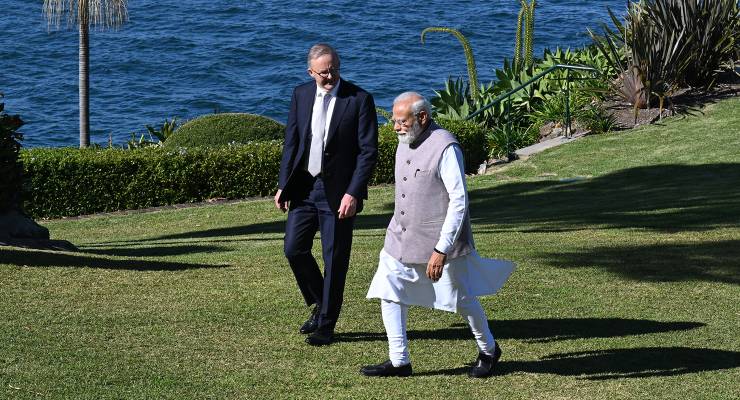
In India, they don’t lay out the red carpet for visiting heads of state.
When Prime Minister Anthony Albanese visited Ahmedabad earlier this year, Indian Prime Minister Narendra Modi produced a golden chariot so the two of them could do a victory lap of a cricket stadium he had named after himself. That left Albanese with a hard act to follow when Modi landed in Australia this week. Lighting up the Opera House in India’s national colours would never compete.
Luckily for Albanese, some 20,000 members of the Indian diaspora came to his rescue with a Bollywood-style extravaganza at Sydney’s Olympic Park. The two leaders didn’t just shake hands: they clenched their fists like bowlers celebrating a hat trick, raised their arms like a pair of Olympic gold medallists, and waved in unison to the rapturous crowd for what was their sixth meeting in just over a year.
“In the language of cricket, our ties have entered the T20 mode,” Modi declared.
After decades stuck in the equivalent of a five-day Test match, one that both teams know is heading for a draw, Australia’s rapidly deepening engagement with India is remarkable — and long overdue. A myopic focus on Asian tiger economies skirting the Pacific Rim has seen India largely ignored by Australian policymakers. While Chinese studies bloomed, universities ditched courses on Indian history and Hindi. Investors moved cautiously, for fear of being no-balled by India’s notoriously fickle bureaucracy. In the corridors of India’s Ministry of External Affairs, Australia was seen as a fellow member of the Commonwealth and a source of cheap coal, but not much else.
In recent years, several factors have changed perceptions on both sides. India’s economy is growing at 6.3%, outstripping China and second only to Saudi Arabia among the G20. Early this year, the investment bank Morgan Stanley forecast that India will be the world’s third-largest economy by 2027, accounting for one-fifth of global growth over the next decade.
In April, India overtook China as the world’s most populous country according to UN estimates — a particularly significant milestone given India’s much younger demographic. Tech giants such as Apple are leading a posse of overseas investors attracted by an abundance of cheap, skilled and often English-speaking labour, as well as by a more friendly business environment.
But it is Australia’s fast-growing Indian diaspora that has been most politically influential in strengthening crucial people-to-people ties. Numbering more than 800,000, Indians are set to overtake Britons as our dominant migrant group in the next five years. Ambitious and well-educated, they are already making their presence felt in politics, business and service industries — and a majority credit Modi for what they see as restoring India’s rightful place in the world.
Modi’s resurgent nationalism plays on two poles — righting the wrongs of its colonial past and standing up to China, with the latter motivating Australia to engage more closely with India on a diplomatic, defence and multilateral level. Central to this engagement is the Quadrilateral Security Dialogue, or Quad, which groups India, Australia, the US and Japan. Behind its slogan of promoting an “open, stable and prosperous Indo-Pacific” is curtailing Beijing’s influence in the region, even though its many statements rarely mention the Asian giant by name.
When he hosted the Forum for India-Pacific Islands Cooperation in Port Moresby earlier this week, Modi’s promise of deeper trade and political links with the South Pacific was deliberately aimed at reinforcing India’s role as a counterweight to China, a role that has muted Western criticism of New Delhi’s refusal to condemn Russia’s invasion of Ukraine.
There is little doubt Australia-India relations are entering a new era. Modi’s second visit to Australia led to the signing of a slew of agreements on everything from migration to research in green hydrogen technology. A Centre for India-Australia Relations will be set up in Parramatta, headed, unsurprisingly, by former test cricketer Adam Gilchrist.
But there are some potentially bumpy wickets that the captains of Australia’s engagement with India will need to negotiate — not least of which is India’s worsening human rights record. Both the Economist Intelligence Unit’s Democracy Index and Freedom House have recently downgraded India’s democratic ranking, citing the intimidation of journalists, academics and nongovernmental organisations, as well as the social and economic marginalisation of groups such as Muslims, untouchables and tribals.
Albanese this week sidestepped questions about rights abuses, telling Channel 7: “It is not up to me to pass a comment on some of [India’s] internal politics”.
Such reticence is puzzling. If Australia’s prime minister is being honest about the closeness of his relationship with a man who never tires of boasting that India is the “world’s largest democracy”, he should have no qualms about publicly calling him to account.








Is it? It is very unusual for governments like ours to rock the boat by making any serious effort to raise such concerns with nations where we do not want to distract from issues we see as much more important, such as trade or security co-operation, and even more unusual when the other nation is regarded, near enough, as friendly or at least useful. It is notorious that the USA, that great champion of democracy, has destroyed several democratic nations when they foolishly elected governments that displeased the USA, and the USA has never had any problem embracing and assisting brutal dictatorships that the USA sees as congenial.
Perhaps, in a better world, those nations that like to say they are committed to liberal democracy and human rights would be happy to engage in a reciprocal system of independent inspecting and reporting how well they each perform on various measures, with a real determination to improve in any areas that fall short. Human rights, free and fair elections with no obstacles to registering and voting, a free press, the rule of law (along the lines set out in Tom Bingham’s book on the subject) and so on. Wouldn’t that be nice? It would certainly be unrecognisable compared to the current world.
China being a giant exception …
China has many problems but in terms of women’s rights, China easily beats India.
Luckily for “us” it is my understanding that most countries ignore Australia’s human rights records in a broad range of areas.
Maybe because their own record is worse.
I was thinking something along similar lines. It’s quite something that the PM can be advocating for a Voice whilst getting about with Modi this way. Turning a blind eye is a process of political reciprocity if you want to maintain your power.
If only those Indian Muslims were Uyghurs….
We are certainly living in a time that gives high school history teachers great ways to help their students understand how people managed to turn a blind eye to things like human rights abuses, slavery and fascism in the past.
Excellent point.
A populist like Trump would be an embarrassment in Australia. A populist like Modi is given a rock star welcome.